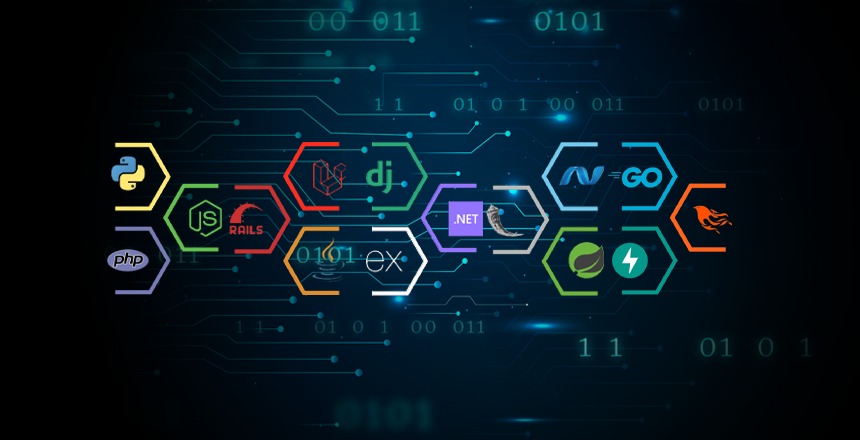Which Framework Best for Backend Development

Choosing the top back-end framework is a tough task since there are many of them. Each framework has its own unique characteristics, benefits, and limitations. This blog will present numerous common back-end programming frameworks, including their distinctive features as well as situations where they perform exceptionally well.
Understanding Back-End Development
Without going into the frameworks first, it is important to understand what back-end development is all about. The back end is that part of a web application that handles the logic on the server side, manages databases, authenticates users, and deals with all API integrations. It is a back-end framework that manages all these tasks easily, thus allowing a developer to work towards developing an efficient and scalable application.
Popular back-end frameworks
1. Node.js with Express.js
Overview:
Node.js is an environment where JavaScripts are executed outside of web browsers, while Express.js is an easy-to-use framework for web applications that provides numerous functions necessary to build strong sites, helping you manage them efficiently from the start until they become fully-fledged products aimed at end users.
Key Features:
Non-blocking I/O is an exceptional feature because it enables the processing of several requests at the same time without delay. Middlewares make it easy to incorporate extra features, such as third-party services. RESTful API development becomes easier through this tool. npm offers a huge number of libraries and modules, thus creating an extensive ecosystem.
Best For:
real-time applications (e.g., chat apps, gaming). single-page applications (SPAs). API services..
1. Node.js with Express.js
Overview:
Django is an advanced web framework for Python that promotes swift development as well as pure and practical design. It operates under the principle of “batteries included," ensuring that it has many built-in functionalities.
5. Stay Updated: Web development keeps changing almost every day. Therefore, staying up-to-date with current trends and technologies is vital.
How to Learn Web Development
There are various ways to learn web development:
1. Digital class initiatives: Sites like Udemy, Coursera, and Codecademy have all-inclusive courses.
2. Coding boot camps are short-term training programs that are focused on imparting coding skills.
3. Self-teaching: this involves making use of freely available materials on the internet, such as articles, manuals, or guides, among others.
4. Books and blogs: literature materials such as novels or ebooks alongside relevant trade journals will broaden your scope of knowledge regarding the various sectors within which they operate.
Is web development a good career?
Web development is a rewarding career for several reasons:
1. Increased Demand: There is a consistent high demand for web developers as more people busily turn to digital platforms.
2. Competitive Package: The pay is good for the web developers.
3. Room for Movement: One can work as a web developer from anywhere and sometimes be hired on a contract basis.
4. Constant Education: You can always find ways to learn and develop yourself in this sector.Which language is best for web development?
There is no single "best" language for web development, but some popular ones include:
1. Javascript: the front-end development that is important and also used by developers in the back-end. (Nodes.js) increasingly.
2. Python: Backend development is usually done using it due to its simple and readable nature.
3. Ruby: It is famous for its elegant syntax, and it is often used with the Rails framework.
4. PHP is a popular choice for server-side scripting.
What do web developers do?
Web developers are responsible for:
1. Designing and Building Websites: Making sites beautiful and usable. 2. Writing code: programming languages are used to build site features and functions. 3. Testing and debugging: making sure the website runs as it should and fixing all issues. 4. Maintaining Websites: Changing Content, Handling Security, and Enhancing Performance.
What is the average salary of a web developer in India?
In India, the average income of a web developer typically depends on various factors such as expertise, locality, and proficiencies. For instance, in the year 2023, junior web developers were projected to receive anywhere from three hundred thousand rupees (₹3) to five hundred thousand rupees (₹5) on a yearly basis. In addition to this, as they acquire more familiarity with this job, their remunerations go up from between eight hundred thousand rupees (₹8) and one million two hundred thousand rupees (₹12) for 12 months, respectively. On the other hand, senior developers or those endowed with distinct capabilities earn beyond fifteen lakh rupees (₹15) within one calendar year.
Will AI replace web developers?
A great number of industries are being transformed by artificial intelligence, and so is web development. AI-powered tools make it possible to automate some features in web design, but these include:
1. Coding Assistance: AI helps to code faster, thus facilitating rapid development.
2. Web Design: Design templates can be created by AI tools as well as optimized for the user
experience.3. Testing and Debugging: Bugs can be detected and fixed more effectively by AI.
Web developer skills
Essential skills for web developers include the following:
1. Proficiency in programming languages such as HTML, CSS, JavaScript, etc.
2. Problem-solving techniques include troubleshooting skills.
3. In addition, it is important to make sure that the website works well and appears clearly at all times.
4. Communication Between Clients and Team Members in Understanding Their Requirements
5. Continuous Learning and Keeping Up With Current Innovations and Developments
Web Development Tools
Some popular tools used by web developers include:
1. Text Editors: Visual Studio Code, Sublime Text, Atom.2. Version Control Systems: Git, GitHub, and Bitbucket.
3. Frameworks: React, Angular, and Vue.js for the front-end; Django, Flask, and Express for the back-end.
4. Task Runners: Gulp, Grunt.
5. Package Managers: npm, Yarn.
Difference Between Web Design and Web Development
When it comes to website creation, web design and web development are often confused for each other but refer to different aspects
1. Web design: it is primarily concerned with the appearance of a website as well as its beauty. It encompasses the establishment of layouts, graphics, and user interfaces. Web designers use Adobe Photoshop, Illustrator, and Sketch, among other tools, to attain their objectives.
2. Web development: focuses on website construction from a technical perspective. This entails writing code, developing functionalities, and making sure everything flows well on the site side. Web developers make use of programming languages in addition to frameworks to accomplish these goals
Conclusion
To sum up, although it is certain that the incorporation of artificial intelligence (AI) into web development will involve some automation of processes and increase productivity levels, the replacement of web developers remains unlikely. The need for creativity, problem-solving capabilities, and an understanding of the user experience cannot continue to be overemphasized in this era. As the discipline evolves, those whose duties as web developers’ involve using AI tools will keep succeeding, thereby increasing chances for originality. If you think about pursuing a career in website creation, you should remain upbeat about the bright prospects in this field, with many avenues for development and victories awaiting you.
- Written By - Natasha Singh









